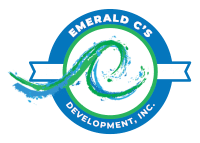Process makes perfect, and when it comes to commercial construction – planning and scheduling are the most critical aspects of an effective process. At Emerald C’s Development, we know. As a full-service general contractor in Jacksonville, FL, we’ve been putting smart construction planning and scheduling processes to work in hundreds of successful commercial interior build-outs, tenant improvements, and commercial renovations for more than a decade.
Why Are Construction Planning and Scheduling So Important?
What makes construction planning and scheduling so important? Because proper planning in these areas are the keys to completing a construction project on time, on budget and in the most timely and cost-efficient manner possible. For property owners, developers, investors, and tenants, this means achieving the best possible outcomes – fewer headaches, reduced risks, meeting budget and financial goals, and seeing a project delivered as specified and planned. For general contractors, it translates into happy customers and more business.
What Does Construction Planning and Scheduling Involve?
Construction planning and scheduling involve developing action plans to achieve your construction project goals. This includes things like project scope, costs and time which include a working budget, calendar and construction schedule. Your construction plan then becomes your primary tool for managing your project, aligning design specifications with the proper resources (materials, labor, etc.) at the right rates, with construction coordinated logically and most efficiently from start to finish. Most construction plans begin with what is called pre-construction planning.
What is Pre-Construction Planning?
Simply put, pre-construction planning is the earliest stage of the construction planning process. It provides the foundation for the rest of your construction plan. During this initial phase, a client will typically meet with their general contractor, landlord, architectural designer, and any other parties necessary to discuss details of the project to be completed.
In this initial project evaluation, the client will discuss their design needs, budget parameters, timing requirements, and other aspects of the construction project. Based on this meeting, the general contractor will then be able to begin putting together an accurate budget estimate by identifying what kind of design, engineering, permitting, materials, methods, equipment, and sub-contract labor will be required to achieve the client’s goals.
This initial pre-construction meeting is typically followed with routine follow-ups as information is compiled, presented, and approved. This includes approval of an initial schematic design that will ultimately lead to a final design and budget. In many cases, it requires value-engineering to help the client achieve certain design goals within their desired budget. All of this pre-construction planning must not only take into consideration the technical aspects of the project, but also the relationships between the various project stakeholders- their own goals, capabilities, limitations, schedules, etc. Initial pre-construction planning transitions into operational planning, and ultimately, construction scheduling and final execution of the plan.
What is Operational Construction Planning?
Operational construction planning is detailing how the construction project plan can and will be delivered to meet project goals and desired specifications identified in the initial pre-construction plans. In this phase, the general contractor will consider such questions as:
- Is the budget sufficient to meet the project objectives?
- What kinds of materials and equipment are involved?
- Will there be cost, availability or delivery issues?
- What are the current material lead times? Are there any known material shortages?
- Is value engineering required?
- What portions of the plan can the general contractor perform?
- What sub-contractors are needed?
- What do existing workloads look like for the project team?
- What obstacles may prevent the plan from hitting the targeted completion date?
- What is the backup plan?
- Does the operational plan align with the initial strategic project plan and goals?
Construction Project Scheduling and Building Plan Execution
Once all of these questions have been answered, construction planning rolls into its final phase: scheduling and the start of construction. When scheduling, the general contractor will be working with information compiled through continuing discussions with all project stakeholders, with a focus on vendors and sub-contractors.
There is often a strong relationship between time and costs, and clients may consider one area to be more critical than the other. Most often, clients and general contractors strive to achieve an optimal balance between these two variables, but there are also times when “fast-tracking” a project at a higher cost may be required due to any number of reasons. In any case, such aspects will be taken into consideration when developing the project calendar.
Finally, once all project plans have been developed, detailed and approved, contracts signed, and the final working construction schedule in place, it is time to commence with the execution of the building plan. Your fully developed commercial construction plan will provide both the “blueprint” and the “roadmap” for your project to come to life and your vision to be realized.
Let Emerald C’s Help You Develop and Execute Your Commercial Construction Plan
If you have an upcoming commercial construction project, interior build-out, tenant improvement, or commercial renovation in Jacksonville or the Northeast Florida area, and are searching for an experienced, reputable, process-oriented general contractor, then contact Emerald C’s Development. From pre-construction project planning to value engineering, project management, and general contracting, our goal is always to help you meet your goals. Initial consultations are always free.

